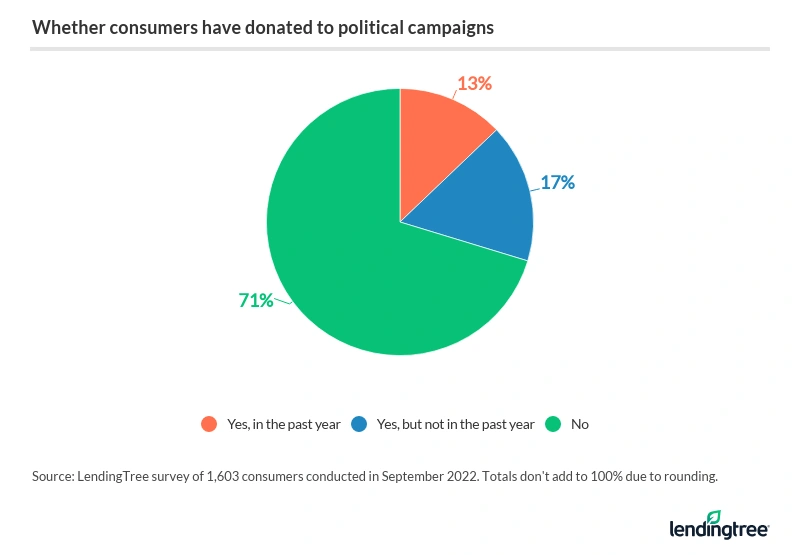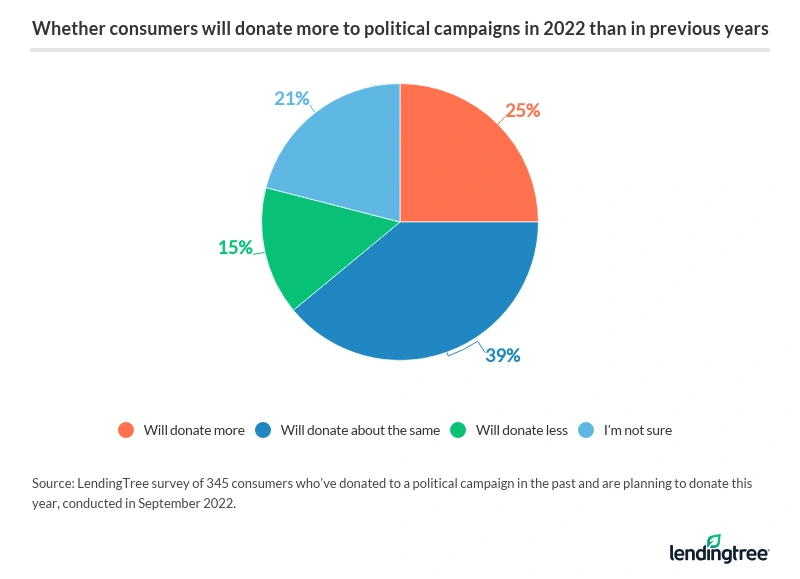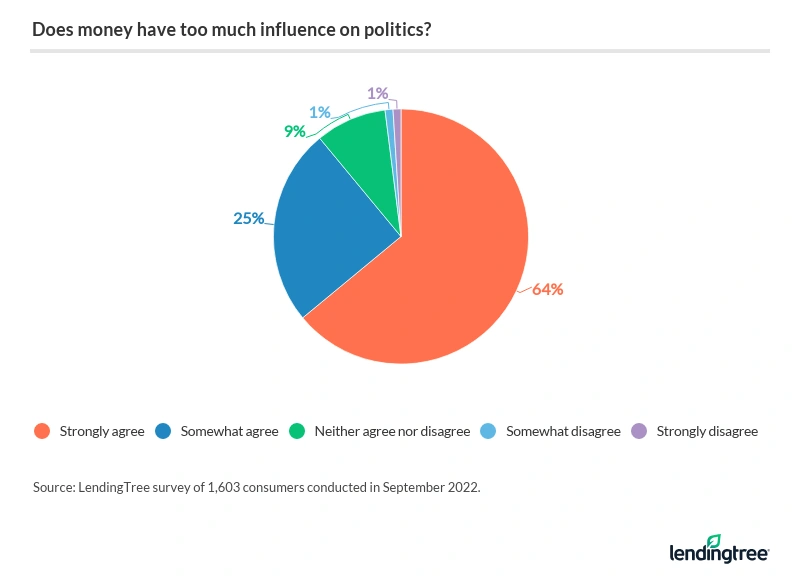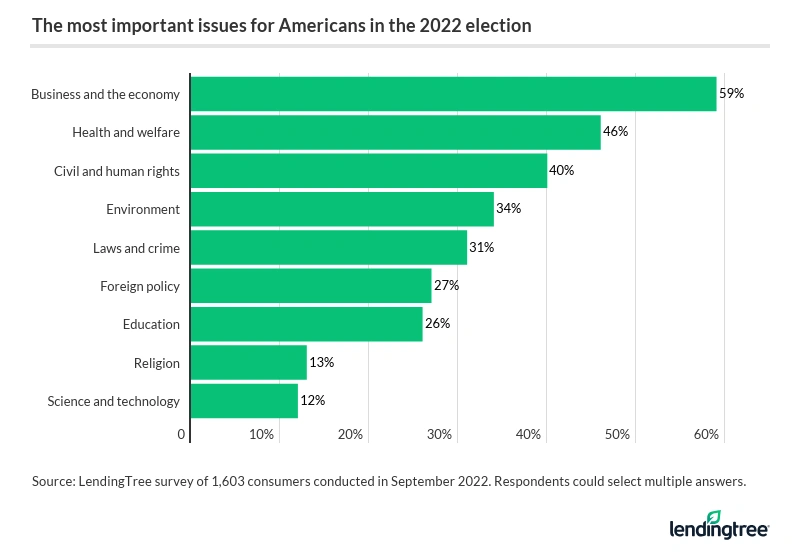71% of Americans Have Never Donated to a Political Campaign, and Most Won’t in 2022
The midterms are approaching, which means American voters are getting ready to hit the polls. Although Americans may cast their ballots this election cycle, many aren’t pulling out their wallets. The majority don’t plan to donate to a political campaign in 2022, according to this LendingTree survey. Going further, most Americans have never contributed to one before.
LendingTree surveyed more than 1,600 U.S. consumers about why they’ve donated (or haven’t) to a political campaign. Additionally, we asked how people who’ve donated made their contributions, from credit card to cash to check. Here’s what we learned.
- 71% of Americans have never donated to a political campaign, and 66% don’t plan to contribute to one in 2022. Another 16% of consumers are on the fence about making a political donation this year.
- Democrats are most likely to make a political donation in 2022, with 29% saying they plan to do so. Only 14% of Republicans say they plan to do the same — 5 percentage points higher than the rate among those identifying as independents (9%).
- Among those who’ve donated before, a quarter (25%) plan to donate more money this year. Overall, however, consumers who’ve donated before aren’t upping their donations this year. Of those who’ve previously contributed to political campaigns and plan to do so this year, 39% say they’ll donate about the same as before.
- 89% of Americans think that money has too much influence in politics. Meanwhile, only 27% of Americans believe their political donations make a difference.
- As a whole, 59% of Americans say the economy is the most important issue in the upcoming election, with more Republicans than Democrats saying so (68% versus 52%). Health and welfare (46%) and civil and human rights (40%) also rank high across the board but are viewed as the top two most important issues to Democrats (52% and 56%, respectively).
Majority of Americans haven’t donated to a political campaign
U.S. politics have grown increasingly divisive, but most consumers aren’t reacting with their wallets. In fact, just over 7 in 10 (71%) of Americans say they’ve never donated to a political campaign.

Of the 29% of Americans who’ve donated to a political campaign before, 13% have done so in the past year. Generationally, younger consumers are more likely to have contributed. Nearly 4 in 10 (38%) Gen Zers ages 18 to 25 donated to a political campaign in the past (38%), followed by millennials ages 26 to 41 (33%). This compares with 27% of baby boomers ages 57 to 76 and 21% of Gen Xers ages 42 to 56.
The reason younger consumers top the list may be due to social media. Of those who’ve donated, 45% have done so after seeing a social media post from the candidate or party’s channel asking them to do so.
Social media influenced these consumers to donate. In turn, certain consumers attempt to influence others online. In fact, 49% of consumers who’ve donated before say they shared their donation on social media to influence others.
Most don’t plan to donate this year — here’s why
Despite an especially tense lead-up to the midterms, 66% don’t plan to contribute to a political campaign in 2022. (Another 16% of consumers are on the fence.)
As inflation continues to cut into most consumers’ budgets, rising costs may play a large role for those skipping donations this year. Among Americans who won’t contribute, 46% say they can’t afford to do so — the most common response. Meanwhile, 43% say they’d rather spend their money elsewhere.
Beyond that, distrust and apathy are common themes. Among the other reasons for forgoing donations:
- 26% think the candidates/parties have enough money and their donation won’t make a difference
- 18% don’t trust any candidate or party
- 13% aren’t interested in politics
- 12% don’t think it’s worth the hassle
- 5% think all the parties and candidates are the same
Red versus blue candidates: Who’s giving the green?
When breaking down the 34% of Americans who plan to donate this year, one political party dominates. Democrats are the most likely to give money, with 29% planning to contribute to a political party or candidate. On the other hand, just 14% of Republicans say they’re planning to do the same — just 5 percentage points higher than the percentage of independents who expect to give (9%).
Regardless of the political party to which they belong, those who plan to contribute aren’t only thinking about the midterms. In fact, 9% plan to donate money to presidential candidates in 2022, though no major candidate has formally entered the 2024 race. Meanwhile, 7% of Americans plan to contribute money to a U.S. congressional candidate’s campaign, though just 35 of 100 U.S. Senate seats are up for election (all 435 U.S. House seats are up for grabs). Local politics also make the list, with 6% planning to donate to a statewide, district or local office candidate.
Americans who plan to donate are typically more driven by their passion for an issue than a candidate or political party. Among those who’ll contribute, 40% say they’ll donate because they’re passionate about a certain issue. Following that, passion for a candidate and passion for a political party tie for the second most common response at 27%.
Some other common reasons for donating include:
- 24% want their voice to be heard
- 17% feel it’s part of their duty as an American
- 16% passionately oppose another candidate
- 15% passionately oppose another party
A quarter of Americans are upping their donations this year — here’s how they’re paying
Most consumers who’ve donated before aren’t increasing their donations this year. Of those who’ve previously contributed to political plans and plan to do so this year, 39% say they’ll donate about the same as they did before. However, a quarter (25%) will donate more.

Still, even those who donate more likely aren’t shelling out much. According to estimates from research group Open Secrets, just 0.5% of Americans contributed more than $200 in 2021-2022. Although that percentage is small, those donors make up 73.7% of all political contributions.
When it comes to the payment methods they’ve used, those who’ve donated generally prefer plastic over paper. Of those who’ve previously contributed to political campaigns:
- 32% paid via credit card
- 30% paid via debit card
- 18% used cash
- 12% used a check
Nearly 3 in 4 (73%) Americans who previously contributed to political campaigns say they chose their payment method for the contribution because of convenience — far outranking any other reason. In comparison, 37% say they chose their payment method based on its safety, and another 16% chose their payment method to receive more credit card rewards.
Regardless of donors’ method, LendingTree chief consumer finance analyst Matt Schulz warns that the convenient method isn’t always the best.
“When spending comes too easily, overspending often isn’t far behind,” Schulz says. “That’s true even with political donations. You have to be thoughtful in figuring out how much to give. As much as you love the candidate you’re supporting, going into debt to donate to them probably isn’t your best choice, especially in times of rampant inflation and rising interest rates.”
That’s not the only way convenience impacts political donors. In fact, 22% of those who’ve contributed to political campaigns say they’re enrolled in automatically recurring political donations.
Americans believe there’s too much money in politics
Regardless of whether they plan on donating, nearly 9 in 10 (89%) Americans think money has too much influence in politics.

By age group, baby boomers are the most likely to agree with this sentiment, at 92%. On the other hand, Gen Zers are the least likely — just 83% of the youngest cohort agree.
Still, most Americans increasingly believe their financial contributions don’t matter. Only 27% believe their political donations make a difference, down from 35% in 2020. Democrats are still the most confident that their contributions matter. While 46% believed so in 2020, that figure is 38% in 2022.
Meanwhile, 37% believe their contributions don’t matter, up from 31% in 2020. That sentiment in 2022 is most commonly felt among independent voters (44%).
Schulz believes inflation may be partially to blame for consumers’ declining optimism. Still, he says that shouldn’t deter Americans from donating.
“There’s what seems like an infinite supply in politics today, and it can make it seem like your little $10 or $25 donation means as much as a grain of sand on the beach,” he says. “Giving $20 to your favorite presidential candidate probably doesn’t matter much in the grand scheme. Giving $20 to your local city council or school board race may be something else entirely. Ultimately, however, it’s about putting your money toward what matters most to you, regardless of whether that money has a big or minimal impact.”
Almost 3 in 5 say the economy is the most important issue
Given that donors are most driven by their passion for a particular issue, what political problems are on consumers’ minds? Amid a year of high inflation, 59% of Americans say the economy is the most important issue in upcoming elections.

Business and the economy consists of topics such as jobs, taxes and monetary policies. Health and welfare includes Medicare and Medicaid, Social Security and unemployment. Civil and human rights, meanwhile, includes abortion, marriage equality and gun control. Some of the other topics consumers were asked about include:
- The environment, including issues like energy and climate change
- Law and crime, including capital punishment and police abuse
- Foreign policy, including immigration, international relations and military and defense
- Education, including teacher pay and higher education
- Religion, including the separation of church and state and school prayer
- Science and technology, including internet neutrality and genetically engineered food
Not only does Schulz believe the tumultuous economy may impact how consumers vote, but he feels it could impact how consumers donate.
“Inflation is clearly an enormous concern for consumers,” he says. “It impacts virtually everything we do and helps shape our views on how well our current leaders are doing their jobs. For some, it will spur them to donate more toward their candidate of choice. For others, it may dampen their enthusiasm about a candidate and keep them from donating anything at all.”
Following the economy, 46% of Americans believe health and welfare is the most important issue. An additional 40% believe civil and human rights issues are the most important.
Republicans (68%) are more likely to cite the economy as their top concern than Democrats (52%). Additionally, six-figure earners are more likely to say the economy is the most important issue. For Democrats, civil rights and health are more important than the economy — 56% of Democrats believe civil and human rights is the most important issue, and 52% believe health and welfare is most important.
What to keep in mind when donating this midterm election cycle
As Americans increasingly focus on November’s races, you may feel motivated to donate to a political candidate or party you support. Increasing costs may feel particularly disheartening, but Schulz says that shouldn’t stop you from donating. He offers the following advice:
- Donate with a credit card. “When in doubt, a credit card is usually a better choice for a purchase or a donation,” Schulz says. “If something goes wrong, such as a donation going through twice, it is likely easier to get that mistake fixed when using a credit card. With a debit card, a mistake means real money being taken from a real account, which can cause real issues when bills come due.”
- Budget your donations. “A good budget aligns your spending with your priorities,” he says. “If you’re dedicated to giving significant amounts of money to a campaign, party or organization, take the time to carve some room out for it in your budget. Taking the time to think ahead allows you to shift some of your spending around to create room for those donations. That way, you won’t have to go into debt to support causes that you’re passionate about.”
- Be cautious about recurring donations. “Politicians make it very simple for Americans to set up recurring donations,” Schulz says. “If you want to donate regularly, setting up recurring payments can make things much easier for you. If you only want to give once, however, and you inadvertently sign up for recurring donations, it can cause real headaches.”
Methodology
LendingTree commissioned Qualtrics to conduct an online survey of 1,603 U.S. consumers ages 18 to 76 from Sept. 23 to 24, 2022. The survey was administered using a nonprobability-based sample, and quotas were used to ensure the sample base represented the overall population. All responses were reviewed by researchers for quality control.
We defined generations as the following ages in 2022:
- Generation Z: 18 to 25
- Millennial: 26 to 41
- Generation X: 42 to 56
- Baby boomer: 57 to 76

